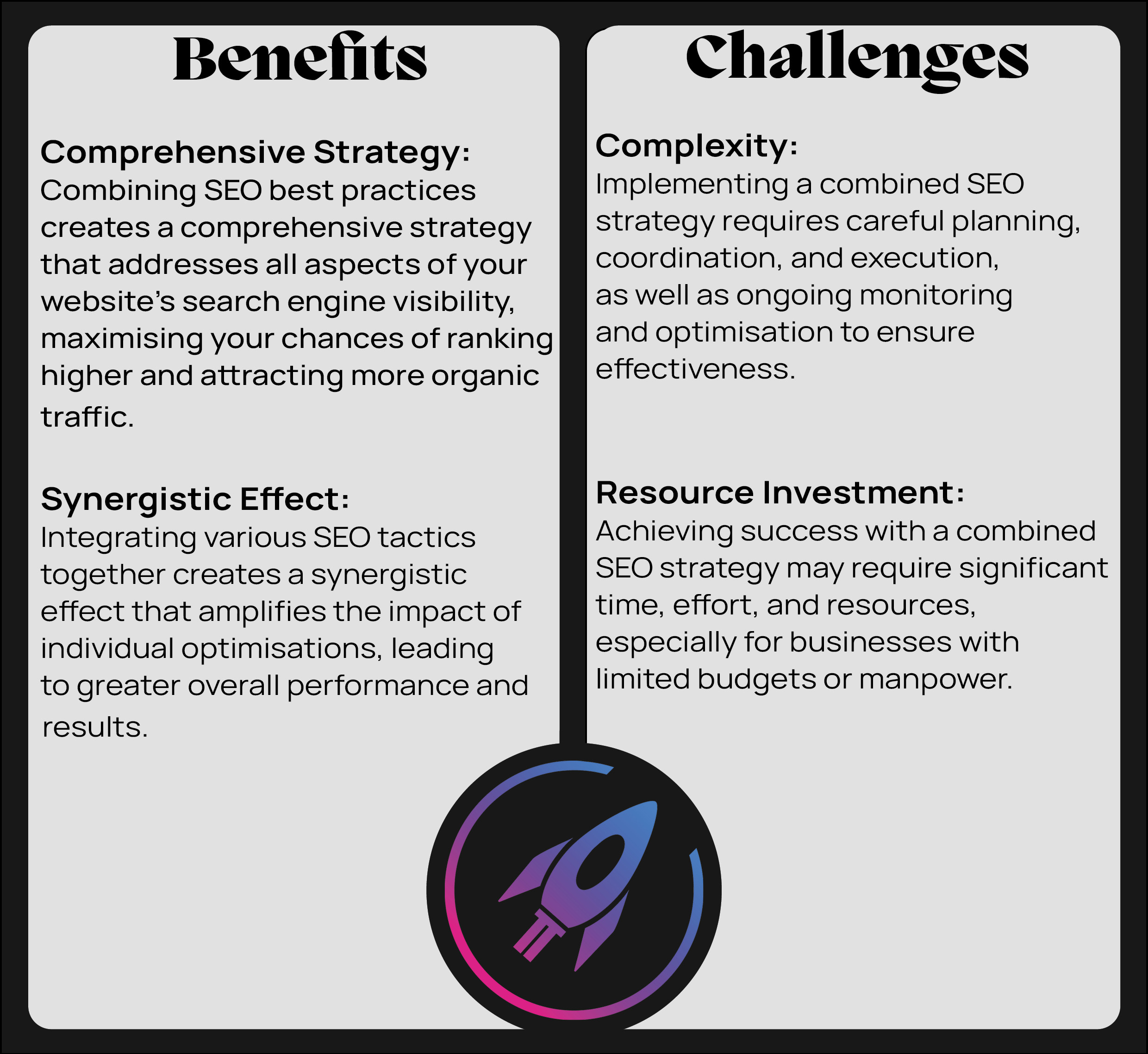Published: 16 Apr 2024
Last updated: 10 Apr 2024
Read time: minutes
Welcome to the world of Super Search Engine Optimisation (SEO) – where the magic of optimising your online presence meets the power of search engines. In this comprehensive guide, we'll take you on a journey through the realm of SEO, demystifying its concepts and exploring its transformative potential for businesses of all sizes.
Let's explore the essential steps involved in developing a digital marketing strategy that sets you up for success.
In the bustling world of online business, where every click counts and every search matters, mastering the art of SEO (Search Engine Optimisation) is akin to unlocking a treasure trove of opportunities for small business owners and startups. But what exactly is SEO, and why should it be a cornerstone of your digital strategy?
Understanding SEO:
SEO is the strategic process of optimising your website's content, structure, and authority to increase its visibility on search engine results pages (SERPs). In simpler terms, it's about ensuring that when potential customers search for products or services related to your business, your website appears at the top of the list.
Why SEO Matters:
In today's hyper-competitive digital landscape, simply having a website isn't enough. With millions of websites vying for attention, standing out amidst the noise requires more than just luck. Here's why SEO is crucial:
- Boosts Visibility:
Think of SEO as your digital storefront's neon sign. It helps you attract organic traffic by ensuring your website ranks higher in search engine results, making it more visible to potential customers. - Drives Quality Traffic:
Unlike traditional advertising methods, SEO targets users actively searching for solutions or information related to your business. This means the traffic you receive is already interested in what you offer, increasing the likelihood of conversions. - Builds Credibility and Trust:
Websites that appear at the top of search results are often perceived as more credible and trustworthy by users. By optimising your site for SEO, you not only improve its visibility but also enhance your brand's reputation. - Cost-Effective Marketing:
While paid advertising can quickly drain your budget, investing in SEO offers long-term benefits at a fraction of the cost. Once your website starts ranking well, you'll continue to receive organic traffic without having to pay for each click. - Insights into Customer Behaviour:
SEO tools provide valuable insights into user behaviour, search trends, and keyword preferences. By leveraging this data, you can tailor your content and marketing strategies to better align with your target audience's needs and preferences.
The Benefits of SEO:
Embracing SEO as a small business owner or startup opens the door to a myriad of benefits:
- Increased Website Traffic:
With improved visibility and higher rankings, you'll attract more qualified leads to your website, ultimately driving growth and revenue. - Enhanced User Experience:
SEO isn't just about pleasing search engines; it's also about creating a seamless and enjoyable experience for your visitors. By optimising your site for speed, mobile-friendliness, and relevant content, you'll keep users engaged and coming back for more. - Competitive Advantage:
In an overcrowded marketplace, staying ahead of the competition is crucial. By outranking competitors on search engines, you'll solidify your position as a leader in your industry and capture a larger share of the market. - Long-Term Sustainability:
Unlike fleeting marketing tactics, the effects of SEO are enduring. By consistently investing in optimisation efforts, you'll lay a solid foundation for sustainable growth and success in the digital realm.
In essence, SEO isn't just a buzzword; it's a powerful tool that can propel your business to new heights in the online sphere. By understanding its importance and harnessing its potential, you'll pave the way for long-term success and prosperity. So, why wait? Start optimising today and watch your business soar to new heights!
Search engines are complex systems designed to index, crawl, and rank web pages to provide users with relevant and useful search results. Here's a simplified breakdown of how search engines work:
How search engines work
Crawling:
Search engines use automated programs called crawlers, spiders, or bots to systematically browse the internet and discover web pages. These bots follow links from one page to another, indexing the content they find along the way. Crawling allows search engines to build an extensive database of web pages, which forms the basis for their search results.
Indexing:
Once a web page is crawled, its content is analyzed and stored in a massive database known as an index. This index contains information about the content, structure, and metadata of each web page, allowing search engines to quickly retrieve relevant pages when a user performs a search query.
Ranking: When a user enters a search query, the search engine's algorithm sifts through the index to identify web pages that are most relevant to the query. The algorithm considers various factors, including keywords, relevance, authority, and user experience, to determine the ranking of search results. Pages that are deemed more relevant and authoritative are typically ranked higher in the search results.
Displaying results:
Finally, the search engine displays a list of search results, arranged in order of relevance and ranking. Each search result typically includes a title, URL, and brief snippet of content extracted from the indexed page. Users can then click on the search results to visit the respective web pages and find the information they're looking for.
Factors Influencing Rankings:
Search engine algorithms take into account numerous factors when determining the ranking of web pages. Some of the key factors include:
- Relevance:
How well the content matches the user's search query. - Authority:
The credibility and trustworthiness of the website and its content. - Keywords:
The presence and usage of relevant keywords in the content, title tags, and meta descriptions. - Backlinks:
The number and quality of links pointing to the page from other websites. - User Experience:
Factors such as page load speed, mobile-friendliness, and overall usability of the website.
Continuous Improvement:
Search engines are constantly evolving, with updates to algorithms and ranking factors occurring regularly. Search engine companies strive to improve the relevance and quality of their search results, providing users with the best possible experience.
In summary, search engines work by crawling and indexing web pages, ranking them based on relevance and authority, and displaying the most relevant results to users when they perform a search query. Understanding how search engines work can help businesses optimise their websites to improve visibility and attract more organic traffic.
Keywords
Keywords are a big deal! They're the magic words that search engines use to track down the most relevant content to display in search results.
Keyword research – a cornerstone practice that unlocks the gateway to your online visibility. It's all about getting inside the minds of your potential customers and deciphering the words and phrases they use to hunt down what they need online. Once you've got a handle on these keywords, you can tailor your website's content to reel in the right kind of traffic and give your search engine rankings a serious boost.
By utilising keyword research, you can understand what your audience is searching for, identify hot search topics, and tailor content to fit these needs. At the heart of every thriving SEO strategy lies keyword research.
From sizing up search volumes and gauging competition to sniffing out those elusive long-tail keywords and subtle semantic variations, thorough keyword research paves the way for precision content optimisation and laser-targeted marketing. So, let's roll up our sleeves and dive into the world of keywords – your ticket to SEO success!
Short-tail vs long-tail keywords
Short-tail keywords, brief and broad, cast a wide net, reaching a large audience but facing stiff competition (e.g. "marketing" or "speakers"). On the flip side, long-tail keywords, more specific and detailed, may attract fewer searches but target a niche audience with precision, resulting in higher conversion rates and less competition. Balancing the two is key to optimising your content effectively and driving impactful results for your business.
Semantic Keywords
Semantic keywords add another layer of depth to your SEO strategy by exploring the contextual relationships between words and phrases. Unlike traditional keywords, which focus solely on specific terms, semantic keywords take into account the meaning and intent behind the search queries.
By understanding the semantic relationships between words, search engines can deliver more relevant results to users. For example, “France” and “Pastry” are semantically related to “Croissant”. This approach allows businesses to optimise their content not only for individual keywords but also for broader themes and concepts, enhancing the overall user experience and increasing the likelihood of ranking higher in search results.
To see more on keywords, check out our blog on mastering keywords.

On-page SEO
On-page SEO refers to the optimisation of individual web pages to improve their search engine rankings and drawing in organic traffic. It's all about fine-tuning individual web pages to shine brightly in the eyes of search engines and users alike. From crafting compelling content to tweaking meta tags, headings, and internal links, every element plays a crucial role in making your pages both search engine-friendly and user-friendly.
To master effective on-page SEO, you need to dive deep into the nitty-gritty details, optimising not just what's visible to users but also the hidden HTML code that powers your pages. This means strategically sprinkling your target keywords throughout your content, fine-tuning meta titles and descriptions for maximum impact, and ensuring seamless use of heading tags and schema markup. It's all about striking the perfect balance between aesthetics and technical finesse to skyrocket your rankings and captivate your audience.
Schema Markup
Schema markup, also known as structured data markup, is a code added to your website to provide search engines with detailed information about your content. It helps search engines understand the context of your web pages, leading to more informative search results for users. By specifying content types like articles, events, or products, schema markup enables search engines to display rich snippets with additional details such as ratings or prices. In essence, schema markup enhances your website's visibility and user experience by providing more relevant search results.
Meta titles & Descriptions
Meta titles and descriptions are concise summaries of your web pages' content. The meta title, visible as the clickable headline in search results, and the meta description, appearing as a brief snippet below, provide users with essential information about your page. Crafting compelling meta titles and descriptions with relevant keywords can boost click-through rates and enhance your website's visibility in search results. They serve as your website's elevator pitch, enticing users to explore further and drive traffic to your site.
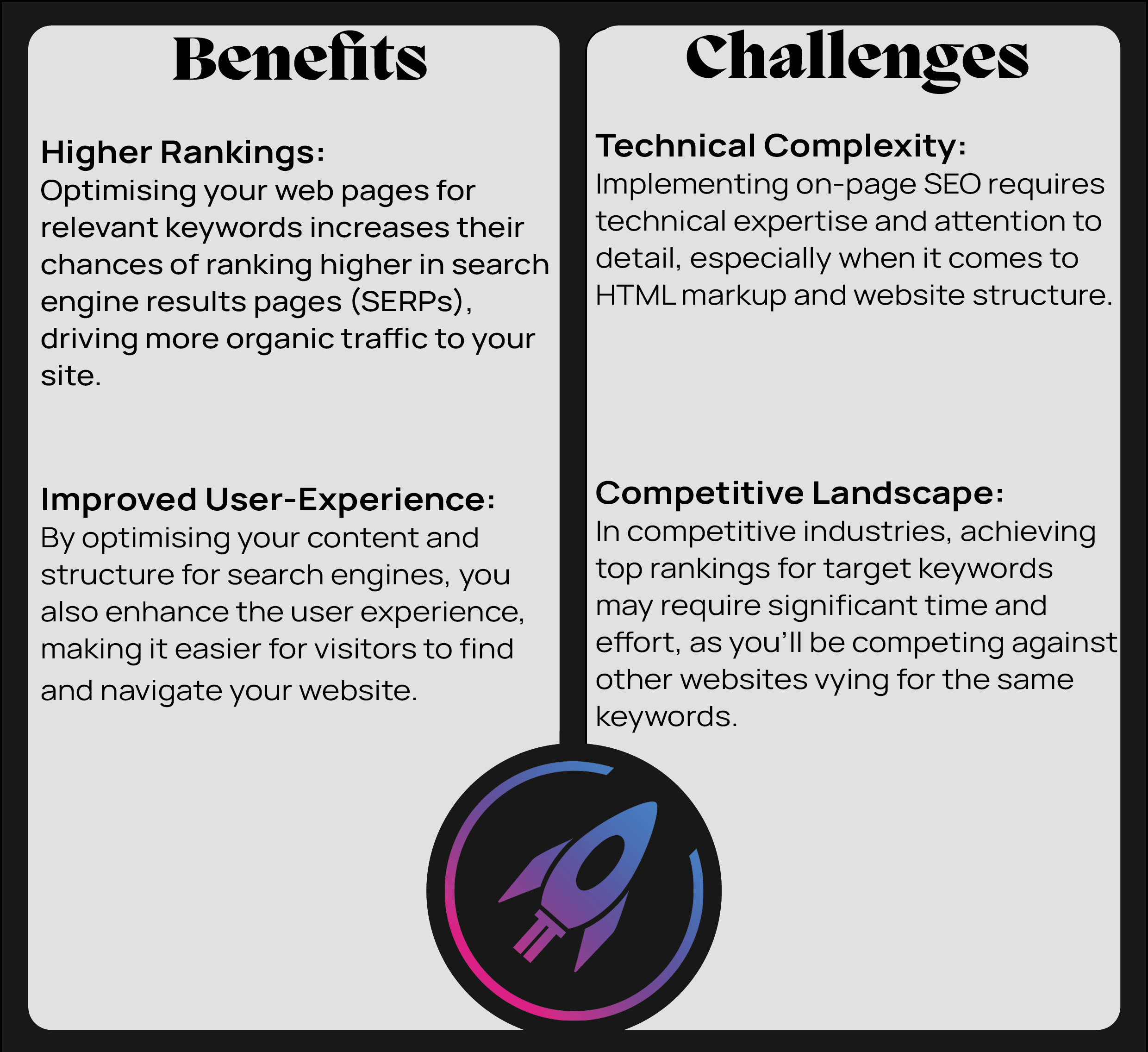
Technical SEO
Technical SEO focuses on optimising the technical aspects of your website to improve its search engine visibility and performance. It involves addressing issues related to website speed, mobile-friendliness, crawl-ability, index-ability, and site architecture, among others, to ensure that search engines can crawl, index, and rank your site effectively.
From optimising site speed and fixing crawl errors to implementing structured data markup and improving mobile responsiveness, technical SEO encompasses a wide range of optimisations aimed at enhancing your website's technical foundation.
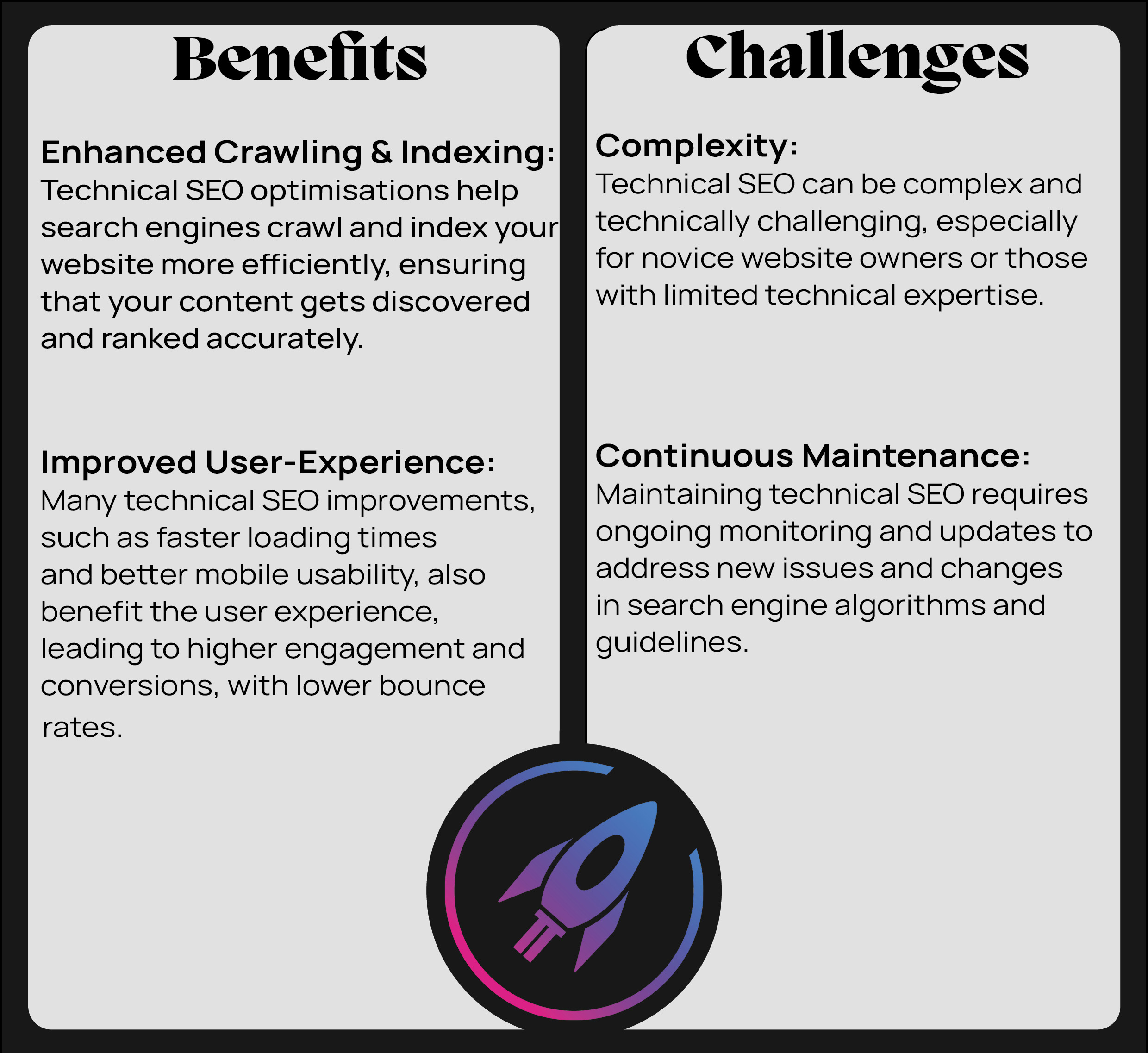
Content Creation and SEO (Copy, Images, and Video)
Content creation and SEO go hand in hand, with optimised content serving as the backbone of your SEO efforts. Whether it's written copy, images, videos, or other multimedia assets, creating high-quality, relevant content is essential for attracting organic traffic, engaging your audience, and driving conversions.
When it comes to content creation and SEO, several key factors come into play. This includes incorporating target keywords naturally into your content, optimising images and videos with descriptive filenames and alt text, and structuring your content for readability and relevance.
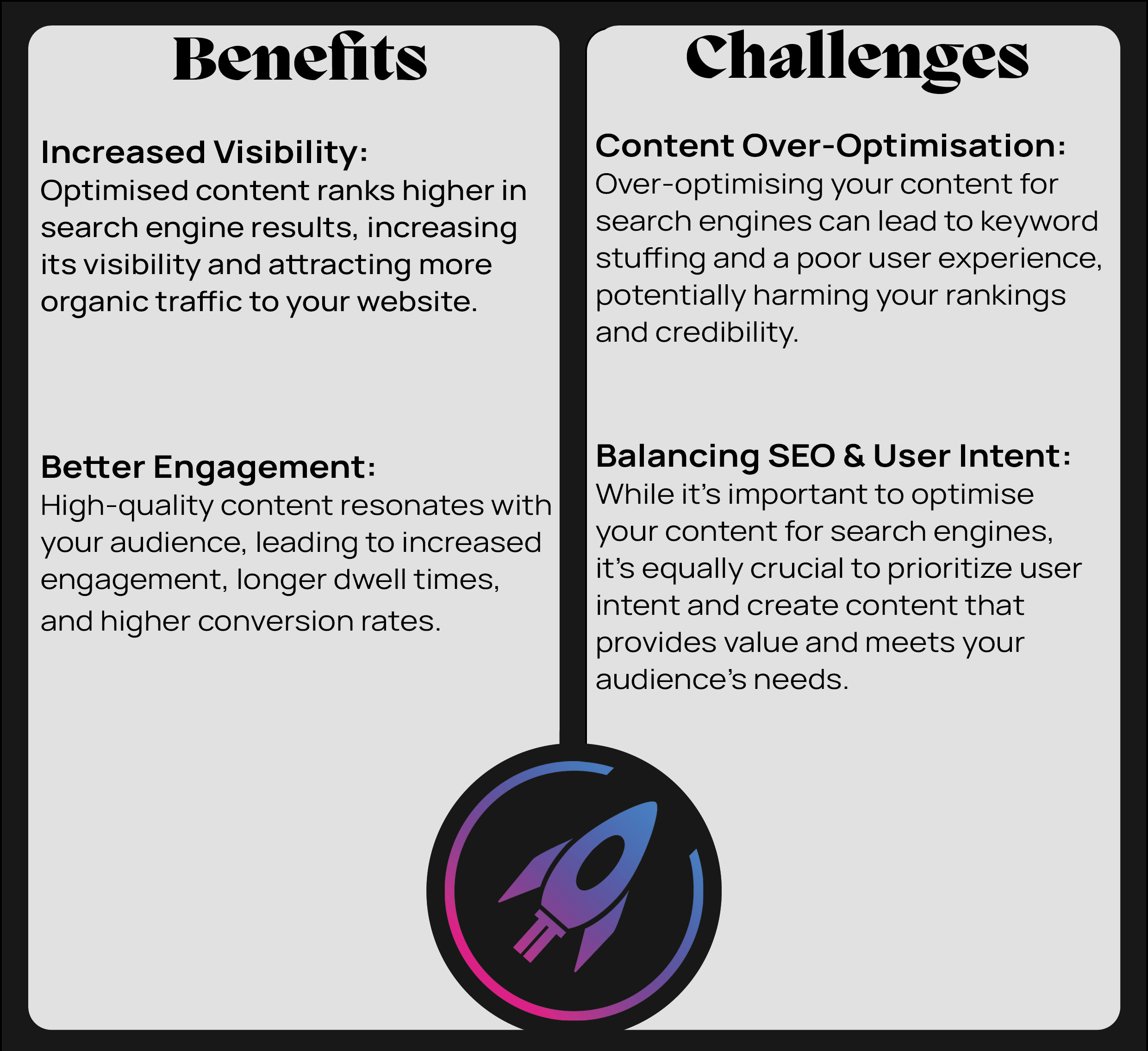
Off-page SEO
Off-page SEO focuses on improving your website's authority, relevance, and trustworthiness through external factors such as backlinks, social signals, and online mentions. It plays a crucial role in determining your site's credibility and visibility in search engine results.
Off-page SEO primarily revolves around building high-quality backlinks from authoritative and relevant websites, as well as establishing a strong social media presence and actively engaging with your audience across various online platforms.
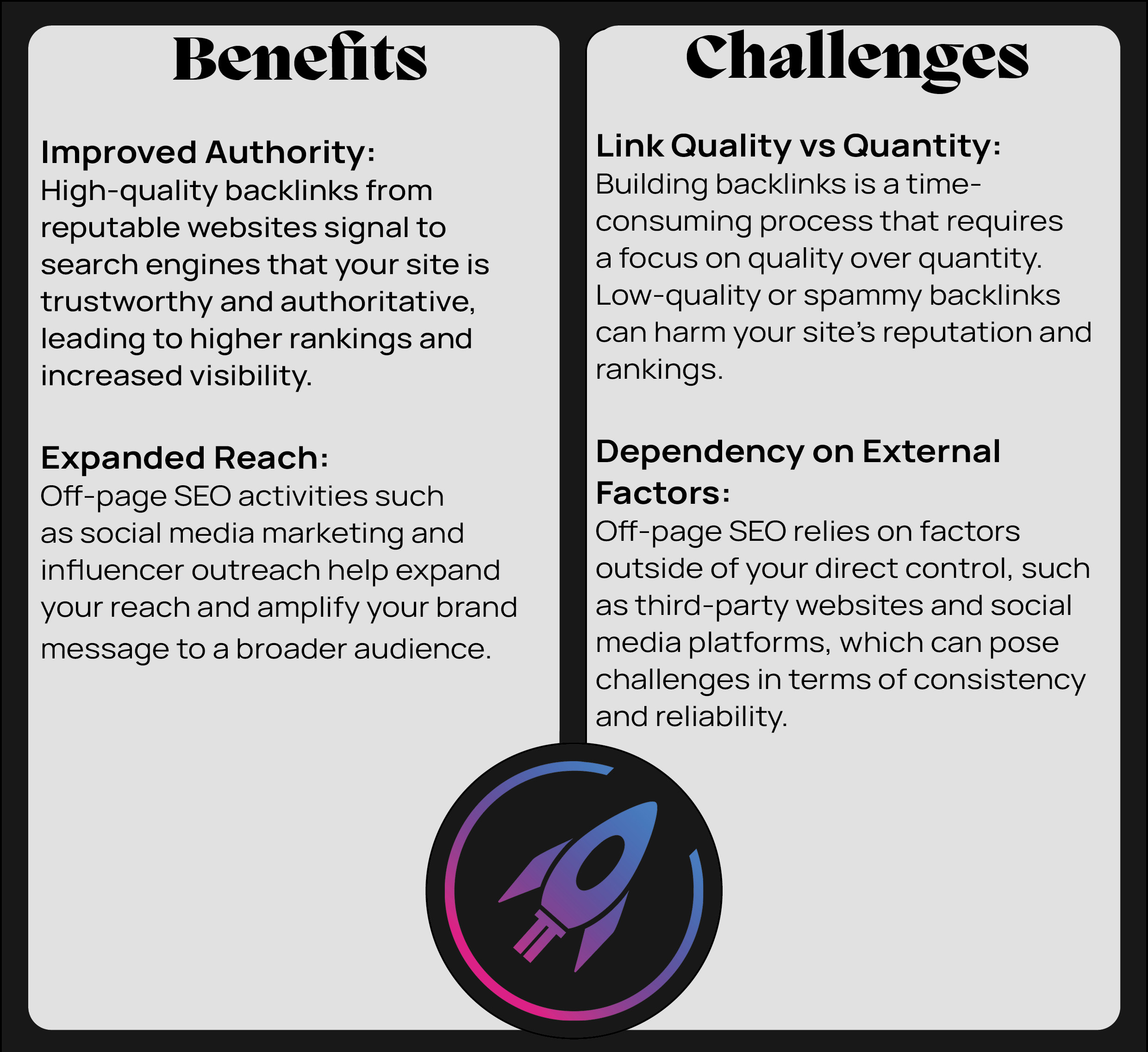
Local SEO
Local SEO is a specialised branch of SEO that focuses on optimising your online presence to attract local customers and improve your visibility in local search results. It's essential for brick-and-mortar businesses and service-based industries looking to connect with customers in their geographic area.
Local SEO involves optimising your website and online listings for location-based keywords, obtaining local citations and reviews, and ensuring consistency across online directories and maps. It also includes optimising Google My Business profiles and leveraging local-focused content and outreach strategies.
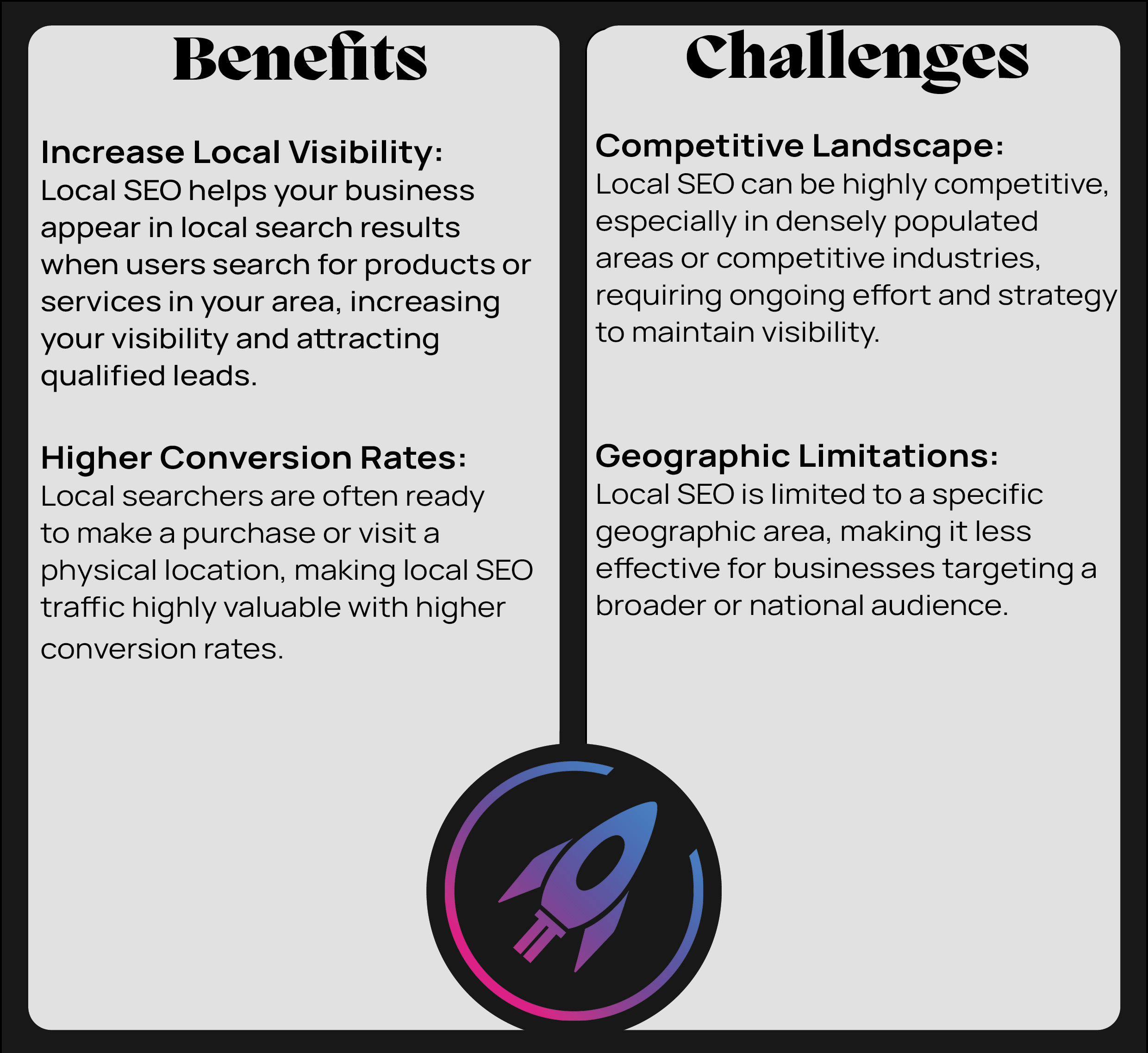
E-commerce SEO
E-commerce SEO focuses on optimising online stores and product pages to improve their visibility in search engine results and attract more organic traffic. It's essential for e-commerce businesses looking to drive sales and grow their online presence.
E-commerce SEO involves optimising product titles, descriptions, and images for relevant keywords, improving site speed and usability, and implementing structured data markup for enhanced search visibility. It also includes optimising category pages, managing product reviews, and building internal links to improve site architecture.
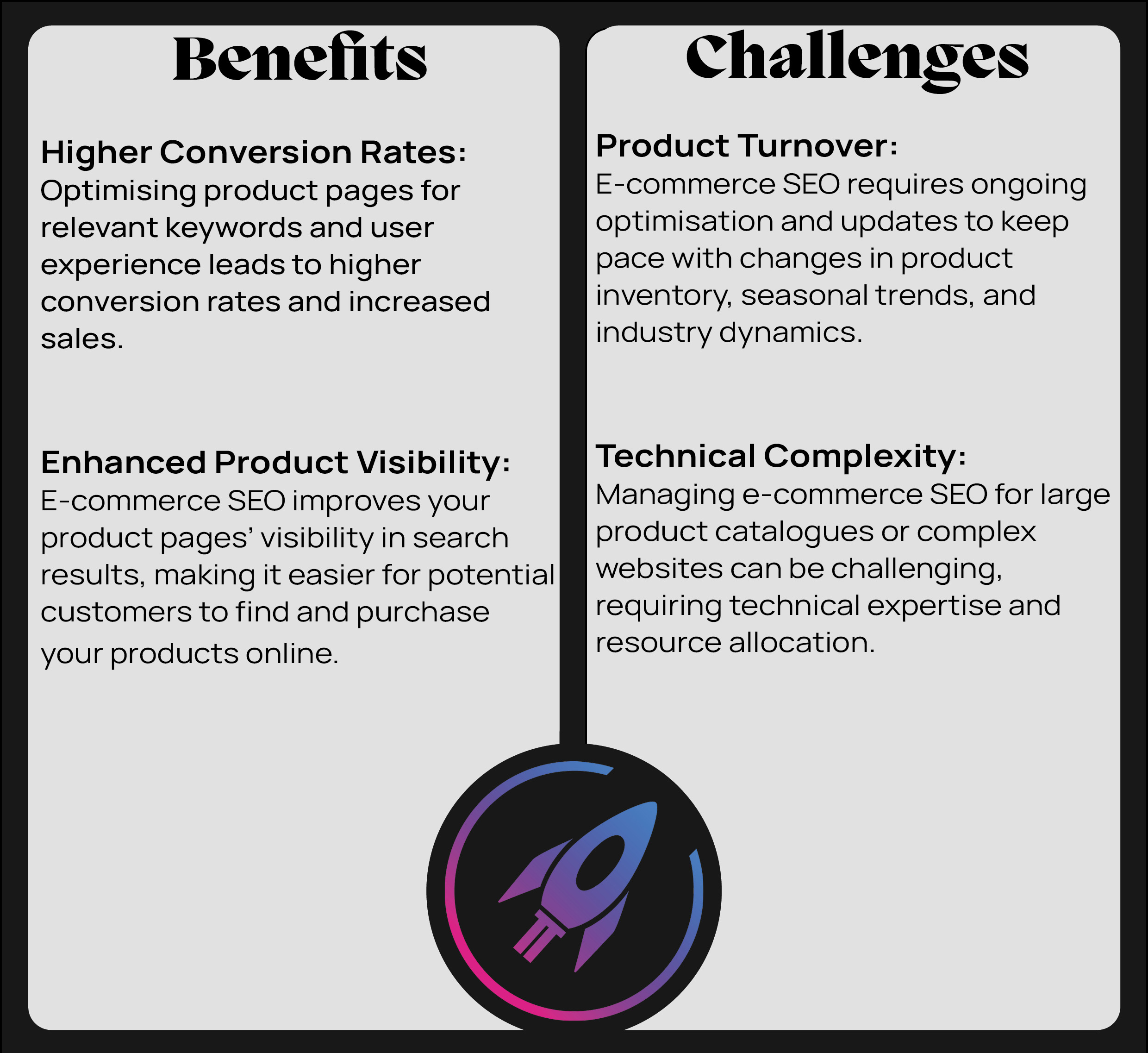
SEO Audits and Updates
SEO audits are comprehensive evaluations of your website's SEO performance, identifying strengths, weaknesses, and areas for improvement. Regular audits and updates are essential for maintaining and enhancing your site's search engine visibility and performance over time.
SEO audits involve analysing various aspects of your website, including on-page elements, technical factors, backlink profile, and overall site health. It also includes identifying and fixing issues such as broken links, duplicate content, and crawl errors, as well as implementing best practices for improved SEO performance.

Combining SEO Best Practices Together
While each aspect of SEO – from keyword research to technical optimisation – plays a crucial role in improving your website's search engine visibility, combining these best practices together creates a synergistic effect that maximises your chances of success. By integrating various SEO tactics into a cohesive strategy, you can achieve better results and outperform your competition.
Combining SEO best practices involves aligning your keyword research with on-page optimisation, technical improvements, content creation, and off-page strategies to create a holistic approach to SEO. It also includes monitoring and analysing your SEO performance, identifying areas for improvement, and continuously refining your strategy to adapt to changing algorithms and market dynamics.
